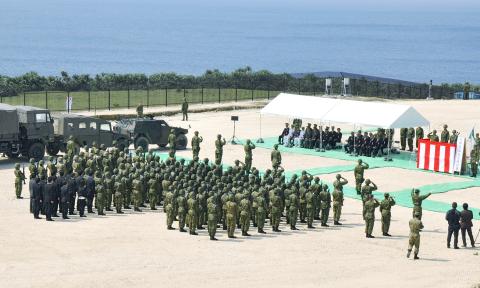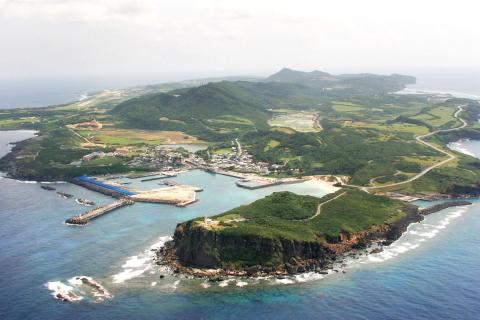Japan yesterday switched on a radar station in the East China Sea, giving it a permanent intelligence-gathering post close to Taiwan and a group of islands disputed by Japan and China, drawing an angry response from Beijing.
The new Japan Self-Defense Forces base on Yonaguni Island is at the western extreme of a string of Japanese islands in the East China Sea, 150km south of the Diaoyutai Islands (釣魚台) — known as the Senkakus in Japan. The Diaoyutais are claimed by Taiwan, China and Japan.
China has raised concerns with its neighbors and in the West with its assertive claim to most of the South China Sea where Taiwan, Philippines, Vietnam, Malaysia and Brunei have overlapping claims. Japan has long been mired in a territorial dispute with China over the East China Sea islands.

Photo: Reuters / Kyodo / Files
“Until yesterday, there was no coastal observation unit west of the main Okinawa island. It was a vacuum we needed to fill,” said Daigo Shiomitsu, a Ground Self-Defense Forces lieutenant colonel who commands the new base on Yonaguni. “It means we can keep watch on territory surrounding Japan and respond to all situations.”
Shiomitsu yesterday attended a ceremony at the base with 160 military personnel and about 50 dignitaries. Construction of some buildings, which feature white walls and traditional Okinawan red-tiled roofs, is still unfinished.
The 30km2 island is home to about 1,500 people, who mostly raise cattle and grow sugar cane. The Self-Defense Forces contingent and family members are to increase the population by 20 percent.

Photo: Reuters / Kyodo / Files
“This radar station is going to irritate China,” Nihon University professor and retired major general Nozomu Yoshitomi said.
In addition to being a listening post, the facility could be used as a base for military operations in the region, he added.
In a statement, the Chinese Ministry of National Defense said the international community needed to be on high alert to Japan’s military expansion.
“The Diaoyu Islands are China’s inherent territory. We are resolutely opposed to any provocative behavior by Japan aimed at Chinese territory,” it said. “The activities of Chinese ships and aircraft in the relevant waters and airspace are completely appropriate and legal.”
The listening post fits into a wider military buildup along the island chain, which stretches 1,400km from the Japanese home islands.
Policymakers last year told reporters it was part of a strategy to keep China at bay in the Western Pacific as Beijing gains control of the South China Sea.
Yonaguni is only about 100km east of Taiwan, near the edge of a controversial air defense identification zone established by China in 2013.
Over the next five years, Japan is to increase its Self-Defense Forces in the East China Sea by about 20 percent to almost 10,000 personnel, including missile batteries that would help Japan draw a defensive curtain along the island chain.
Chinese ships sailing from their eastern seaboard must pass through this barrier to reach the Western Pacific, access to which Beijing needs both as a supply line to the rest of the world’s oceans and for naval power projection.

The CIA has a message for Chinese government officials worried about their place in Chinese President Xi Jinping’s (習近平) government: Come work with us. The agency released two Mandarin-language videos on social media on Thursday inviting disgruntled officials to contact the CIA. The recruitment videos posted on YouTube and X racked up more than 5 million views combined in their first day. The outreach comes as CIA Director John Ratcliffe has vowed to boost the agency’s use of intelligence from human sources and its focus on China, which has recently targeted US officials with its own espionage operations. The videos are “aimed at

STEADFAST FRIEND: The bills encourage increased Taiwan-US engagement and address China’s distortion of UN Resolution 2758 to isolate Taiwan internationally The Presidential Office yesterday thanked the US House of Representatives for unanimously passing two Taiwan-related bills highlighting its solid support for Taiwan’s democracy and global participation, and for deepening bilateral relations. One of the bills, the Taiwan Assurance Implementation Act, requires the US Department of State to periodically review its guidelines for engagement with Taiwan, and report to the US Congress on the guidelines and plans to lift self-imposed limitations on US-Taiwan engagement. The other bill is the Taiwan International Solidarity Act, which clarifies that UN Resolution 2758 does not address the issue of the representation of Taiwan or its people in

US Indo-Pacific Commander Admiral Samuel Paparo on Friday expressed concern over the rate at which China is diversifying its military exercises, the Financial Times (FT) reported on Saturday. “The rates of change on the depth and breadth of their exercises is the one non-linear effect that I’ve seen in the last year that wakes me up at night or keeps me up at night,” Paparo was quoted by FT as saying while attending the annual Sedona Forum at the McCain Institute in Arizona. Paparo also expressed concern over the speed with which China was expanding its military. While the US

SHIFT: Taiwan’s better-than-expected first-quarter GDP and signs of weakness in the US have driven global capital back to emerging markets, the central bank head said The central bank yesterday blamed market speculation for the steep rise in the local currency, and urged exporters and financial institutions to stay calm and stop panic sell-offs to avoid hurting their own profitability. The nation’s top monetary policymaker said that it would step in, if necessary, to maintain order and stability in the foreign exchange market. The remarks came as the NT dollar yesterday closed up NT$0.919 to NT$30.145 against the US dollar in Taipei trading, after rising as high as NT$29.59 in intraday trading. The local currency has surged 5.85 percent against the greenback over the past two sessions, central